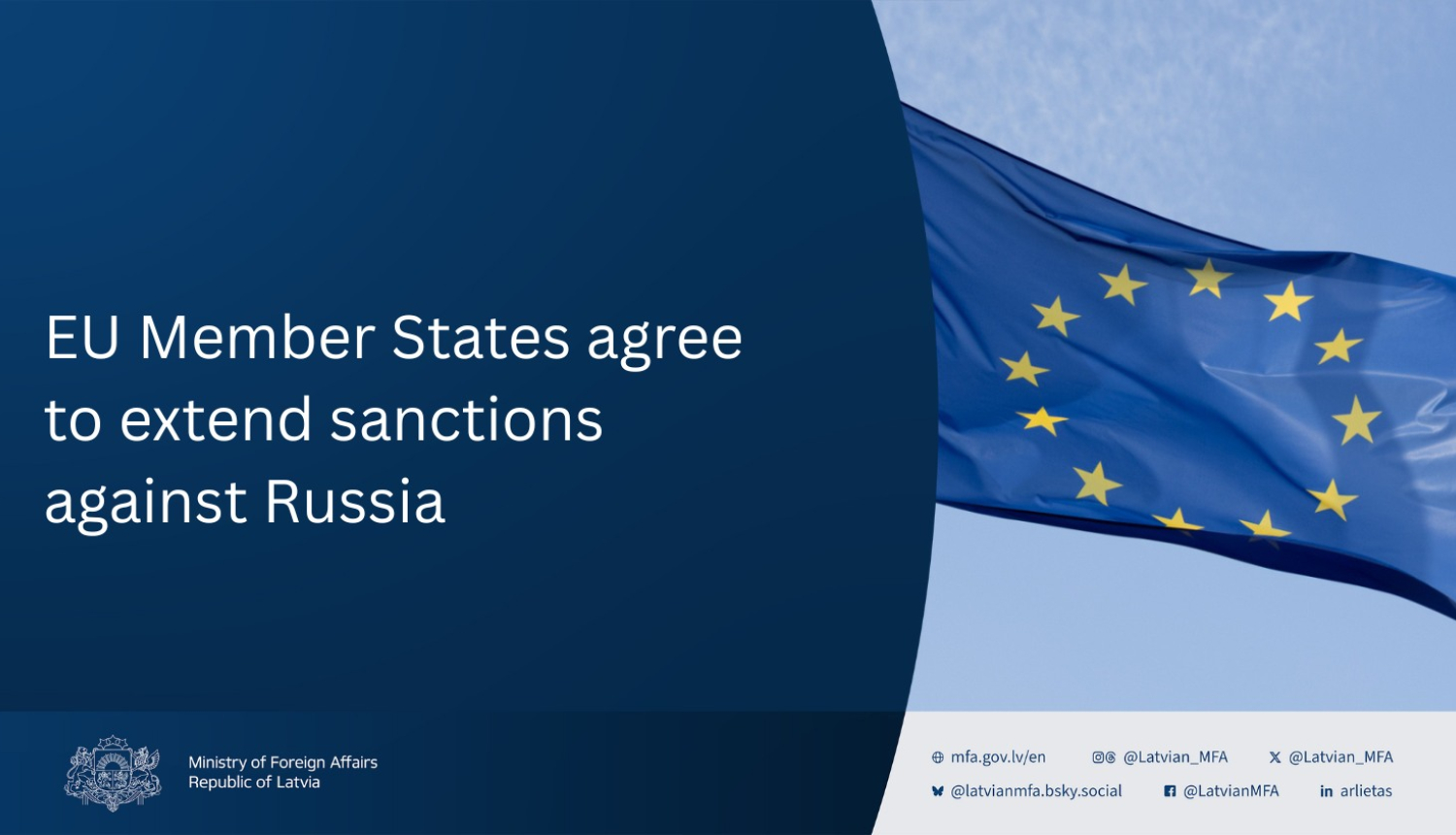On Friday, 12 September 2025, the Council of the European Union (EU) unanimously decided to extend for another six months, until 15 March 2026, the restrictive measures against those responsible for undermining or threatening the territorial integrity, sovereignty and independence of Ukraine. 2,529 persons (1,894 individuals and 635 legal entities) have been retained on the sanctions list. Sanctions against Russia are not being weakened. This is the common position of Latvia and other EU member states.
A number of individuals subject to EU sanctions are also subject to sanctions by other countries, including the United States, Canada, Ukraine, the United Kingdom, Switzerland, Australia, and New Zealand.
As part of a regular review of each sanction regime (every six months in the case of sanctions against Russia), the Legal Service of the EU Council provides its assessment of the legal basis of evidence for sanctioning persons and the EU Council carefully evaluates it in its discussions and takes an appropriate decision on the extension of the sanctions.
As on earlier occasions, this process of extending the “individual” EU sanctions regime against Russia was also complex; however, the EU Member States were able to maintain consensus and a united position – no person was removed from the sanctions list due to political motivation.
EU sanctions against Russia – since 2014
Since 2014, the European Union (EU) has been imposing individual sanctions on individuals and legal entities for actions that undermine or pose threat to the territorial integrity, sovereignty and independence of Ukraine[1]. Among the individuals subject to EU sanctions are the Russian President, Prime Minister, Foreign Minister, other members of the government and presidential administration, high-ranking officials and military personnel, representatives of the judiciary, companies important to the Kremlin regime and their leaders, oligarchs, propaganda figures, the media and others who support the Kremlin’s aggressive policies.
The EU sanctions against Russia (both sectoral and individual) are to be extended every six months. This requires the unanimity of all the 27 EU Member States. If EU Member States fail to reach an agreement within the specified period, the sanctions regime will not be extended and will cease to apply to all individuals and legal entities included in the sanctions list. The deadline for the Member States to agree on the renewal of individual sanctions was 15 September 2025[2].
Latvia’s position
Latvia’s position is based on the statements of the Saeima of 24 February and 21 April 2022 on Ukraine, which called for the application of maximum sanctions, and on the decisions of the Cabinet, which were reapproved by the Informational Report adopted at the 2 September 2025 Cabinet meeting on the matters to be considered at the informal meeting of the European Union Foreign Affairs Ministers (25-TA-2057 (DV)).
The Latvian Government holds a position that current sanctions should be extended until Russia has ceased its aggression, fully restored the territorial integrity of Ukraine within its internationally recognized borders, and compensated Ukraine for the losses caused. Latvia also advocates for the timely extension of EU sanctions against Russia, which is part of the EU’s support for Ukraine. It is important for Latvia that the individual sanctions regime for actions that undermine or threaten the territorial integrity, sovereignty, and independence of Ukraine be maintained. We stand up in the strongest terms against any efforts to weaken the sanctions, including politically motivated attempts to remove individuals from the list.
In accordance with Latvia’s national interests and the EU’s common sanctions policy, Latvia, as before, neither proposed nor advocated for the lifting of sanctions against any individual or legal entity, regardless of their nationality. On the contrary, Latvia has always called for further strengthening of sanctions, by actively participating in the work on the latest rounds of sanctions and proposing the inclusion of additional individuals and legal entities, shadow fleet ships, etc. in the sanctions list, in order to undermine Russia’s capabilities and budget revenues, and, in cooperation with our allies and partners, achieve that the invasion stops.
Talks on the extension of sanctions are always held in behind closed doors.
[1] COUNCIL REGULATION (EU) No 269/2014 of 17 March 2014 concerning restrictive measures in respect of actions undermining or threatening the territorial integrity, sovereignty and independence of Ukraine
[2] COUNCIL DECISION (CFSP) 2025/528 of 14 March 2025 amending Decision 2014/145/CFSP concerning restrictive measures in respect of actions undermining or threatening the territorial integrity, sovereignty and independence of Ukraine




